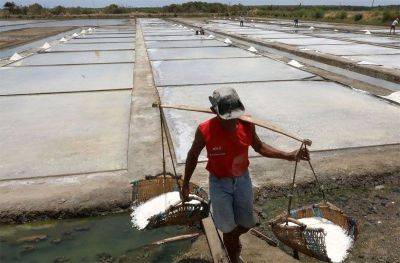Converting ponds to salt farms threatens mangrove restoration, conservationists warn
BATAAN, Philippines — The Philippines is facing a new challenge in its efforts to restore vital mangrove ecosystems: the conversion of fishponds into salt farms.
As the government seeks to revitalize the country's struggling salt industry, conservationists warn that allowing abandoned, undeveloped, and underutilized (AUU) fishponds to be converted into salt farms risks exacerbating the degradation of mangroves.
“Mangroves need brackish water and can hardly survive or grow in conditions that are too high in salinity. So salt farming and mangrove survival are unlikely to co-exist,” said Annadel Cabanban, president of Wetlands International Philippines.
According to Cabanban, excessive water salinity can stunt mangrove growth, reduce biomass and impair photosynthesis. It also makes it difficult for mangroves to absorb water and nutrients, hindering their survival.
“We are already in a race against climate change. If we lose any more mangroves, the more vulnerable our country will be to coastal flooding, erosion, and storm surges,” she said.
Mangroves provide a range of ecosystem services, including coastline protection, carbon storage and sequestration, and provision of habitats for various species. Mangroves also support the livelihood of coastal communities.
Last year, the Senate and the House of Representatives approved a bill outlining measures aimed at reviving the salt industry. It was sent to President Ferdinand Marcos Jr. for his signature in February.
The proposed Philippine Salt Industry Development Act would establish a roadmap with programs and projects for the management, research, modernization, and commercialization of salt.
The measure also allows the use of fishponds for salt farming or production.
“They are targeting abandoned ponds, but not all abandoned ponds qualify because one requirement for a good salt bed is clear water. If you do that, it’s not cost-efficient,” said Jocel Pangilinan, Wetlands International Philippines project manager.
“So after a while, you’ll need to invest a large amount of capital to sustain it because with the significant capital you’re putting out, you’ll just incur huge losses compared to the returns you’ll get,”






